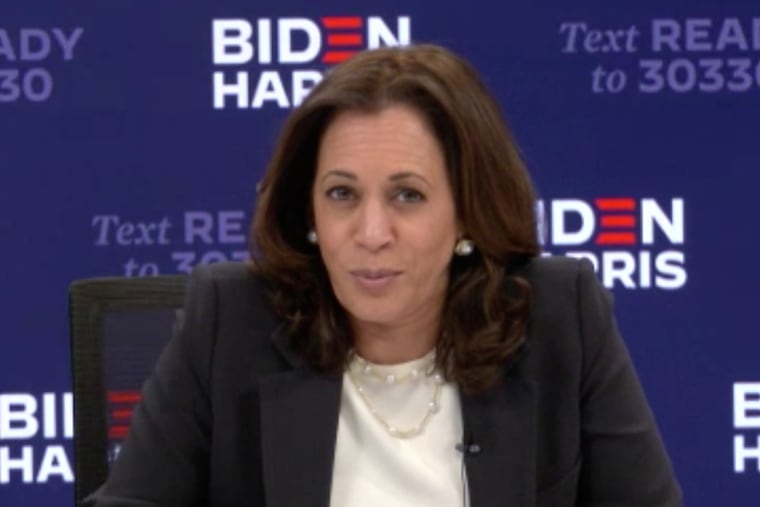Kamala Harris wants to speak to the Black community. Are we ready to listen? | Solomon Jones
Kamala Harris can’t be symbolic like Obama. She must be substantive, and she must be able to answer the tough questions so many of us have.

Hours before a presidential debate that erased the boundaries of political decorum, I spoke to Democratic vice-presidential nominee, U.S. Sen. Kamala Harris. I asked her about the concerns of Black Philadelphians — a community that could very well decide the election.
In the state’s most populous city, where African Americans make up nearly half the population, Black people could be the key to winning Pennsylvania. And without Pennsylvania, Joe Biden’s path to the presidency narrows considerably. That makes Harris, a woman of Black and South Asian heritage, more than just a capable running mate. She is an ambassador who can speak to African Americans in ways that Biden simply cannot.
That’s why when I asked Harris what she and Biden would do about the most virulent, in-your-face racism I’ve seen in my lifetime, her answer was interesting because it was an answer that only a Black woman would give.
“I would beg to differ in terms of this,” she said. “It is perhaps more evident, but the racism that we have been experiencing, it remains constant in terms of the effects … I think so much about this pandemic has been an accelerator, meaning folks who were doing badly before are doing worse now. When we look at the racial disparities that have been highlighted during the course of the pandemic — be it public health, be it economic, be it education — you see the disparities based on race highlighted. But they existed before …
“We have to speak the truth about the fact of racism.”
» READ MORE: Stacey Abrams pours the sting of loss into making sure others can vote | Solomon Jones
Harris said that she and Biden had a plan to deal with racial disparities by investing in Black businesses, addressing the health disparities exposed by COVID-19, putting $70 billion into Historically Black Colleges and Universities, and adopting a national standard on the use of force in policing.
But Harris knows she has to do more than quote policy and budget numbers. She has to speak to the experiences of Black people who are tired of promises, tired of disappointment, and tired of a Democratic Party that speaks nicely, but doesn’t deliver significant change on race.
When Barack Obama ran for office in 2008, the excitement in the Black community was palpable. Obama, the first Black man to have a serious chance of winning the presidency, was himself the change that he so often spoke about. He was brilliant, he was articulate, and he was qualified.
Harris, the first Black woman on a major party’s ticket, shares those qualities, but in a Black community that has waited patiently for something big to happen, seeing a Black candidate is not change anymore. We’ve already been through that, which means Kamala Harris can’t be symbolic like Obama. She must be substantive, and she must be able to answer the tough questions so many of us have.
Yesterday I asked Harris if she had ever opposed police body cameras, as some of her critics have claimed. Harris said no. In fact, she said, she helped to push body cameras when she was attorney general of California — a fact that a quick search of her record confirmed.
But Harris’ past as a prosecutor has brought more questions, including a query from a cynical Black man who confronted her about the overrepresentation of African Americans in the criminal justice system when she visited Philadelphia this month. She told him things would change, and yesterday when I spoke with her, I asked her how that change would come about.
» READ MORE: Democrats owe Black voters more than Kamala Harris’ nomination | Solomon Jones
“I wish that I had more time with the brother,” Harris told me. “Because he was there — I think that was his son — and he knows the life experience he has had as a man. And there’s not a Black man that I know — be he a relative or a friend — who has not experienced some form of racial profiling or excessive force or unreasonable stop. Not one. And he’s raising a Black child to be a Black man. So his level of concern and righteous anger with a system that has been fueled and in many cases enforced by racial bias and institutional and systemic racism was real, and I respect that.”
Harris ticked off a few policies that she and Biden would implement to slow mass incarceration in America, including an effort to stop jailing people for drug use.
Such commonsense ideas are good, but after a debate in which her running mate faced a president unconcerned about rules and decorum, Harris, the former prosecutor, will have to make her case to my community.
I believe her Blackness equips her to do so. I only hope that we are prepared to listen.